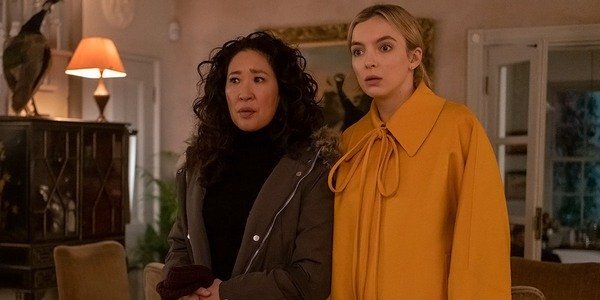OnScreen Review: 'Killing Eve' - Season 3
Martha Wrench, Contributing Critic
As the world went into lockdown, the producers of the much-loved crime drama, Killing Eve, decided to bring forward the release of its third season to provide some lockdown entertainment for us all. And how excited we all were! For a quick second. A show which originally came onto our screens with more than a splash of style, charisma, and witty dialogue has become no more than a caricature of itself.
The once unexpected and energetic writing of Phoebe Waller-Bridge has given way to cringe attempts to replicate this same style by subsequent writers whilst Villanelle’s flair for fashion and attention-seeking assassinations have become lifeless and annoyingly cartoonish.
The main issue with this season is the way it abandons its titular character. It was Waller-Bridge who championed the investigation of female relationships, arguing that women are in fact more interested in each other than in romantic relationships or the other trite topics that have become seemingly synonymous with females on screen, and it was this focus that separated Killing Eve from the rest. Eve and Villanelle’s two-way fascination with each other was a key component of the series that hooked viewers, unsure whether they were going to kill each other or make out with each other upon each meeting.
Season Three’s movement away from this leaves a hole which they are unable to fill with the various other plotlines that they create in order to distract from this. Of course, as with any show, there must be development throughout the series, and it would have been a mistake to continue in the exact same way. However, in distancing themselves from this element of the show as much as they do, they lose the spark that so defined it. It is not enough that Eve eventually returns to following Villanelle’s movements, as by this point the focus is not on Villanelle but more on her association with ‘The Twelve’, a secret organisation involved in the death of Kenny, the son of Eve’s former boss.
Instead, the focus is dispersed between multiple supporting characters, people who were previously joyful additions to the main composition and who added elements of surprise and fun as well as shocking twists, but who were by no means the core of the plot. By diversifying the focus of the show, they create the potential to give supporting characters greater depth, an opportunity they miss, however, due to their inability to give each character their due time, resulting in a mish-mash of different plotlines all vaguely tied together by the search for the elusive ‘Twelve’. (I still can’t decide whether the portrayal of Caroyln’s daughter, Geraldine, as the most annoying character to ever have appeared on screen is its greatest success or biggest failure). The season therefore lacks focus with no singular force driving it forward. The attempts to spice it up with elaborate costumes and messy assassinations come across as garish and silly, only exposing further its feeling of disorientation.
The season is not without its positives, however. Jodie Comer, as always, shines in her role as Villanelle. Unpredictable, childish, and dangerous, she continues to command attention and brings an endless amount of energy to her scenes. Her Scottish persona in the penultimate episode once again showcases her chameleon-like ability to switch between characters and is highly amusing in the process.
There is also a genuine co-existence of humour and tension in the confrontation scene between Carolyn and Konstantin in the final episode, with Villanelle and Eve being told off like school children whilst the series reaches the climax of its plot as we find out how Kenny died. Unfortunately, this is short-lived. The revelation of Kenny’s accidental death comes as a let-down. It has been the sole thread running throughout the season, tying it all together (as much as it could) and yet it is revealed and moved past in less than two minutes.
Whether we believe Konstantin or not is another matter, nevertheless, his admittance to this accidental death is underwhelming. Had the series been more focused and held greater excitement throughout, then this accidental death may have packed more of an emotional punch and been a greater contrast to the countless assassinations that have occurred in past seasons. It is therefore its past failures that cements its disappointing ending.
Season Three makes a clear attempt at providing more than the glamorous and shocking assassinations that have defined its previous seasons, but its execution is not definitive enough. In trying to give the audience some of that previous thrill whilst also trying to move it forward in a new way, the creators do neither and the result is a bland and unfocused middle ground.
